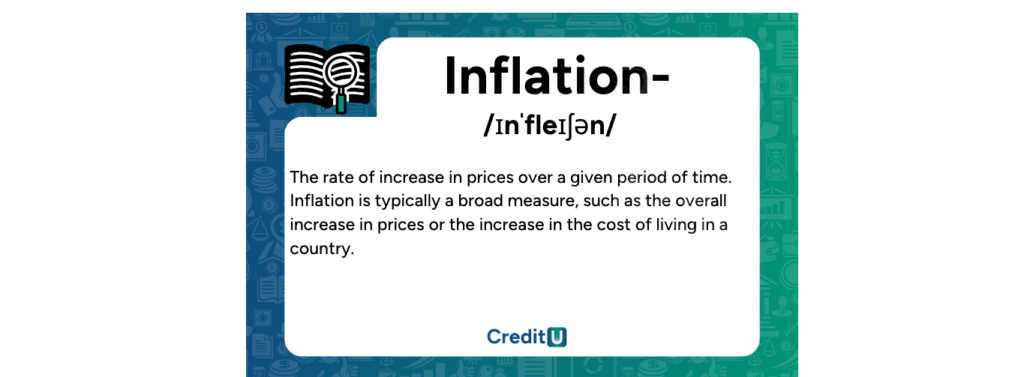How to Handle Inflation
August 1, 2023
 As you probably hear in the news, the economy tends to fluctuate. But by being aware of any changes, you can plan accordingly. One big example is inflation. So, what really is it and how to handle inflation?
As you probably hear in the news, the economy tends to fluctuate. But by being aware of any changes, you can plan accordingly. One big example is inflation. So, what really is it and how to handle inflation?
Inflation, the rate at which the general level of prices for goods and services rises, decreasing purchasing power, is a word that can throw consumers and investors off the course of their money management efforts. While mild inflation is generally considered normal in a growing economy, heightened inflation can have significant impacts on your financial well-being.
Topics Covered What is Inflation? Understanding Inflation Causes of Inflation Types of Inflation How to Handle Inflation What Can CreditU Do For You? Key Insights
What is Inflation
There are a few types of inflation (such as demand-pull inflation, cost-push inflation, or built-in inflation), but the common outcome is that prices of goods increase. With rising prices, your money suddenly doesn’t go as far as it used to. This can weaken people’s purchasing power.

Inflation refers to the rate at which the general level of prices for goods and services rises, resulting in a decrease in the purchasing power of money. Essentially, when inflation is occurring, each unit of currency buys fewer goods and services than it did previously.
Understanding Inflation
While it is easy to measure the price changes of individual products over time, human needs extend beyond just one or two products. Individuals need a big and diversified set of products as well as a host of services to live a comfortable life. They include commodities like food grains, metal, fuel, utilities like electricity and transportation, and services like healthcare, entertainment, and labor.
Inflation aims to measure the overall impact of price changes for a varied set of products and services. It allows for a single value representation of the increase in the price level of goods and services in an economy over a period.
Prices rise, which means that one unit of money buys fewer things. This loss of purchasing power impacts the cost of living. This ultimately leads to a deceleration in economic growth.
To fight this, the monetary authority (in most cases, the central bank) takes the necessary steps to manage the money supply and credit to keep inflation within permissible limits and keep the economy running smoothly.
Inflation is measured in a variety of ways depending on the types of goods and services. It is the opposite of deflation, which indicates a general decline in prices when the inflation rate falls below 0%. Keep in mind that deflation shouldn’t be confused with disinflation, which is a related term referring to a slowing down in the (positive) rate of inflation.
Causes of Inflation
The primary driver of inflation is the expansion of the money supply, which can manifest through various economic pathways. The financial authorities of a nation can amplify the money supply by:
- Distributing newly printed money to its citizens.
- Officially devaluing, or lowering the worth of, the national currency.
- Creating new funds as reserve account credits within the banking system. This is typically done by purchasing government bonds from banks in the secondary market – a prevalent method.
In each scenario, the currency’s purchasing power diminishes. The processes through which this triggers inflation can be broadly categorized into: demand-pull inflation, cost-push inflation, and built-in inflation.
Types if Inflation
Several factors can contribute to inflation:
Demand-pull inflation:
This occurs when demand for goods and services exceeds their supply. It can be caused by increased consumer spending due to lower interest rates, increased government spending, etc.
Cost-push inflation:
This type of inflation results from the rising costs of production, which are then passed onto consumers in the form of higher prices. Reasons for increased production costs can include higher raw material prices or wages.
Built-in inflation:
Also known as wage-price inflation, this occurs when workers demand higher wages and, if they get those higher wages, companies then raise their prices to cover the higher wage costs.
Central banks, like the Federal Reserve in the U.S., monitor inflation rates and can implement policies to try to control inflation. One of the primary indicators of inflation is the Consumer Price Index (CPI), which measures the average change over time in the prices paid by urban consumers for a basket of consumer goods and services. It’s worth noting that mild inflation is generally considered normal in a growing economy. However, hyperinflation (extremely rapid and out-of-control inflation) can be damaging, eroding savings and distorting prices. On the flip side, deflation, which is the reduction of the general level of prices, can also be problematic, as it may lead to reduced consumer spending and economic contraction.
How to Handle Inflation
Rework Your Budget
Your budget is the cornerstone of your finances. If the cost of your needs are increasing, find ways to save. Groceries are a good example. Meal planning can be an effective way to crack down on your grocery budget. Knowing your set menu for the week will help you stick to a list. You can also find ways to save on items (such as buying the store brand marinara sauce instead of the name brand, if you eat spaghetti every week). Creating a meal plan around cheaper staples (such as beans or frozen fruit) can also help you stay on budget.
Other needs to save money on include your phone plan and utilities. If you’re still having trouble affording your needs despite cutting back, decrease your “wants” spending to accommodate your needs. During inflation, it’s crucial to prioritize expenses like housing, food, utilities, transportation, your phone, internet, and any debt payments you have.
Save and Invest
Money can get tight during inflation, but it’s still important to set aside some money for savings and investments. An emergency fund can help you pay for surprise expenses (which may become even more expensive in times of inflation), and investing to earn interest can help offset the impact of inflation on your savings. Take advantage of your IRA (both Roth and traditional) and certificate of deposits. Remember to diversify your investments, so that your eggs aren’t all in one basket (or in this case, industry). For further guidance on retirement planning, speaking with a Certified Financial Planner (CFP) can help.
Work on Paying off Debt
Another side effect of inflation? If you have high-interest debt, it can become even more expensive. That’s because inflation usually leads to higher interest rates. To reduce financial strain, create a plan to get out of debt. The Debt Avalanche Method is especially helpful for high-interest debt. This is when you pay off your debts in order of interest rate. Start with the highest interest rate. Focus one paying off one balance at a time in order of interest rate, while still paying the minimum balance on all the other debts. If you’re still having trouble paying off debt though, CreditU can help! With our debt management tools, you can create a personalized repayment plan, and reach a (real!) credit counselor if you have any questions.
What Can CreditU Do For You?
Your personal finances are dictated by how the economy is churning, When the inflation and a country’s economy is going against consumers purchasing power and cost of living, there are several adjustments you can do to adjust your spending patterns. Your financial management is made easy with expert money management apps such as CreditU.
From financial goal settling, debt management to tracking spending and savings CreditU is equipped with a ton of features to help you keep up. The budgeting portion of the app can help you keep track of your income and your expenses and help you keep your money on track. The app makes it easy to adjust your budget depending on the economic conditions as well as your personal financial situation changes. You can adjust your goals depending on your situation and work as you go. There is expert help available to get the necessary financial advice when you need them.
With CreditU, you can take control of your finances and build a more secure future for you and your partner. Download CreditU today! For more information on CreditU, visit our features page.
Key Insights – Living a Debt Free Life
1. When inflation hits hard, your best course of action is to re-evaluate your finances.
2. Inflation is the rate at which prices for goods and services rise.
3. It is sometimes classified into three types: demand-pull inflation, cost-push inflation, and built-in inflation.
4. Inflation can be viewed positively or negatively depending on the individual viewpoint and rate of change.
5. When inflation hits hard, your best course of action is to re-evaluate your finances. We hope that these tips on how to handle inflation helps. CreditU knows that finances can look different for everyone, so if you ever need personalized guidance, check us out!
Last Updated on January 11, 2024 by Dilini Dias Dahanayake






